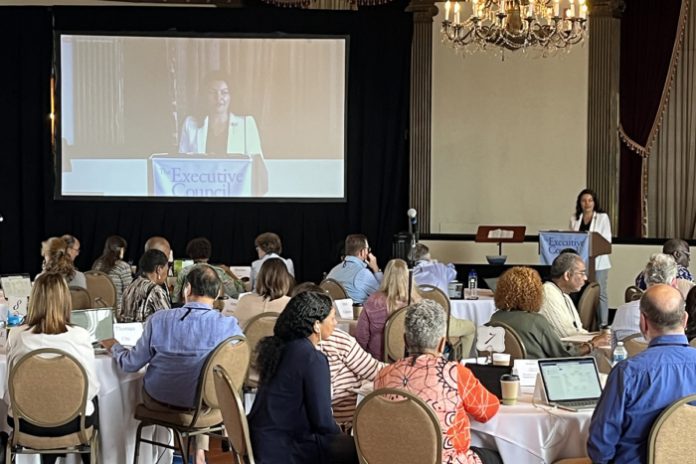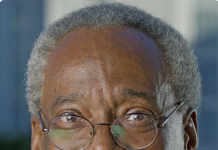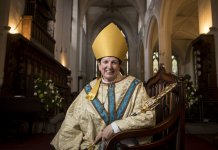Talk of scarcity and abundance permeated the first day of Executive Council’s June 12-15 meeting here, as Episcopal Church leaders reviewed denominational data showing membership decline, financial resiliency and growing challenges in matching clergy to the hundreds of Episcopal congregations in search of priests.
House of Deputies President Julia Ayala Harris, in her opening remarks, warned against accepting a “scarcity mindset” as the church and its 1.5 million members look to the future. She compared today’s landscape to that of Jesus’ disciples in the first decades and centuries of the church.
“The church was being born and it was discerning who it would be, what our identities would be as followers of Jesus Christ and the way of love,” Ayala Harris said. “Just as the disciples were commissioned in the early days of the church, we are commissioned now: We are called by Jesus into the crucial ministry of embodying love and action in our communities.”
The Episcopal Church is “being called to let go of our scarcity mindset and embrace the abundant blessings that the Holy Spirit has given us,” she said, adding, “at the churchwide level, we sometimes talk too much about numbers, numbers of people in the pews, and not enough about the fruit of our ministries.”
Executive Council is the church’s governing body between meetings of General Convention. It meets three times a year and typically is chaired by the presiding bishop. Ayala Harris is leading this meeting while Presiding Bishop Michael Curry remains at home receiving medical care and monitoring for atrial fibrillation and internal bleeding.
Curry addressed members of Executive Council in brief, pre-recorded video remarks, thanking everyone for their prayers, messages and cards. “I’ll be praying for you as you pray for me as well,” Curry said. “I’m resting and paying attention to the body, soul and spirit.”
In his report to Executive Council, Kurt Barnes, the church’s chief financial officer, invoked the themes of abundance and scarcity. Despite lingering financial uncertainty from the COVID-19 pandemic, he underscored that The Episcopal Church’s general outlook remains strong.
He drew special attention to diocesan assessments – the money that dioceses contribute each year to the churchwide budget. Those assessments are the largest revenue line in the budget, about $29 million in 2023 out of $51 million in budgeted income. For 2023 and 2024, the church maintained its assessment on diocesan revenue at 15% while increasing the amount of revenue exempted from that assessment from $140,000 to $200,000.
Barnes said eight of the church’s 110 dioceses applied for and received hardship waivers from the payments in 2023, but most dioceses committed to paying the full 15%, raising the estimated budget total to a higher-than-expected $30 million.
“Here’s an instance of abundance, and sharing the abundance across the church,” Barnes said.
This four-day meeting of Executive Council is being held at the Graduate, a 101-year-old hotel in downtown Providence. The next meeting is scheduled for October in Panama.
Executive Council’s 40 voting members are a mix of bishops, other clergy and lay leaders. Twenty are elected by General Convention to staggered six-year terms – or 10 new members every three years. The Episcopal Church’s nine provinces elect the other 18 to six-year terms, also staggered.
Those members are tasked with focusing “a wide-angle lens on our beloved denomination,” Ayala Harris said in her opening remarks. The final presentation of the morning June 12 was devoted to providing data on the denomination’s “evolving reality and landscape.”










